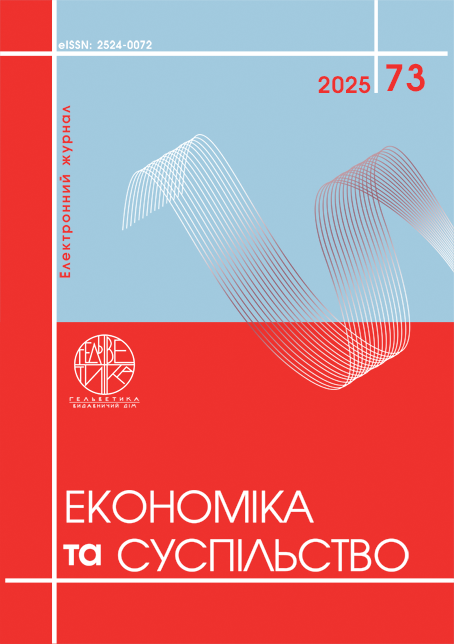APPROACHES TO CHOOSING METHODOLOGIES FOR PLANNING IT PROJECTS ACCORDING TO THEIR KEY CHARACTERISTICS
Abstract
The article investigates the peculiarities of planning methodologies in IT project management, focusing on the formation of a system of methods applicable at various planning stages. Due to the rapid development of information technologies and the specific characteristics of software engineering, IT projects increasingly rely on agile approaches that ensure adaptability, stakeholder involvement, and incremental development. The study compares general project management processes described in the PMBOK Guide with those typical for IT development projects, identifying discrepancies in stages, such as implementation and support, which are critical in software life cycles. A classification of key features of both traditional and agile project methodologies, including Waterfall, Scrum, Kanban, Lean, Spiral, RAD, PRINCE2, and V-Model, is presented. Each methodology is evaluated based on multiple criteria such as development duration, budget constraints, flexibility to changes, client interaction, error handling, and team structure. The authors develop a detailed recommendation matrix that aligns specific project characteristics with the most appropriate planning and development methodologies. It is concluded that for most real-world IT projects, a hybrid or situational approach combining elements of different methodologies is often more effective than strict adherence to a single model. Additionally, the article explores existing decision-making tools for methodology selection, such as the analytical hierarchy process (AHP), scoring models, and SWOT analysis, and discusses modern intelligent systems employing machine learning algorithms (e.g., random forest) to support decision-making in dynamic project environments. The research contributes to enhancing the quality of IT project planning by offering a practical, metrics-based framework for selecting methodologies tailored to a project’s unique parameters, ultimately improving project outcomes and minimizing risks.
References
Настанови до Зводу знань з управління проєктами (Настанови PMBOK) та Стандарт управління проєктами. Сьоме видання. - Project Management Institute (PMI), 2021.- 370с.
Christina Chin, Eng Hwa Yap, Andrew C Spowage. (2012) Project Management Methodologies: A Comparative Analysis, Journal for the Advancement of Performance Information and Value 4(1) https://doi.org/10.37265/japiv.v4i1.102
Anisur Rahman. (2024) IT-project management frameworks: evaluating best practices and methodologies for successful it project management. Academic Journal on Artificial Intelligence, Machine Learning, Data Science and Management Information Systems, Vol. 01, Issue 01. P. 57-76/ https://doi.org/10.69593/ajaimldsmis.v1i01.128
C. Koudriachov, C. Tam, M. Aparicio. (2025) Success with Agile Project Management: Looking back and into the future. Journal of Systems and Software, Vol. 226, 112428. https://doi.org/10.1016/j.jss.2025.112428
S. Balaban, Jasmina Đurašković. (2021) Agile Project Management as an Answer to Changing Environment. European Project Management Journal 11(1):12-19. https://doi.org/10.18485/epmj.2021.11.1.2
Seniv, M. M. (2021). Suite for selection of software development methodology with reference to project metrics. Scientific Bulletin of UNFU, 31(3), 120-125. https://doi.org/10.36930/40310318
Огляд популярних баг-трекінгових систем. URL: https://training.qatestlab.com/blog/helpful-materials/overview-of-popular-bug-tracking-systems/ (дата звернення: 15.04.2025)
Nastanovy do Zvodu znanʹ z upravlinnya proyektamy (Nastanovy PMBOK) ta Standart upravlinnya proyektamy. Sʹome vydannya [Project Management Body of Knowledge (PMBOK Guide) and Project Management Standard, Seventh Edition] Project Management Institute (PMI), 2021.- 370 p.
Christina Chin, Eng Hwa Yap, Andrew C Spowage. (2012) Project Management Methodologies: A Comparative Analysis, Journal for the Advancement of Performance Information, Value 4(1) https://doi.org/10.37265/japiv.v4i1.102
Anisur Rahman. (2024) IT-project management frameworks: evaluating best practices and methodologies for successful it project management. Academic Journal on Artificial Intelligence, Machine Learning, Data Science and Management Information Systems, Vol. 01, Issue 01. P. 57-76/ https://doi.org/10.69593/ajaimldsmis.v1i01.128
C. Koudriachov, C. Tam, M. Aparicio. (2025) Success with Agile Project Management: Looking back and into the future. Journal of Systems and Software, Vol. 226, 112428. https://doi.org/10.1016/j.jss.2025.112428
S. Balaban, Jasmina Đurašković. (2021) Agile Project Management as an Answer to Changing Environment. European Project Management Journal 11(1):12-19. https://doi.org/10.18485/epmj.2021.11.1.2
Seniv, M. M. (2021). Suite for selection of software development methodology with reference to project metrics. Scientific Bulletin of UNFU, 31(3), 120-125. https://doi.org/10.36930/40310318
Ohlyad populyarnykh bah-trekinhovykh system. [Overview of popular bug tracking systems] URL: https://training.qatestlab.com/blog/helpful-materials/overview-of-popular-bug-tracking-systems/ (accessed April 15, 2025)

This work is licensed under a Creative Commons Attribution 4.0 International License.


